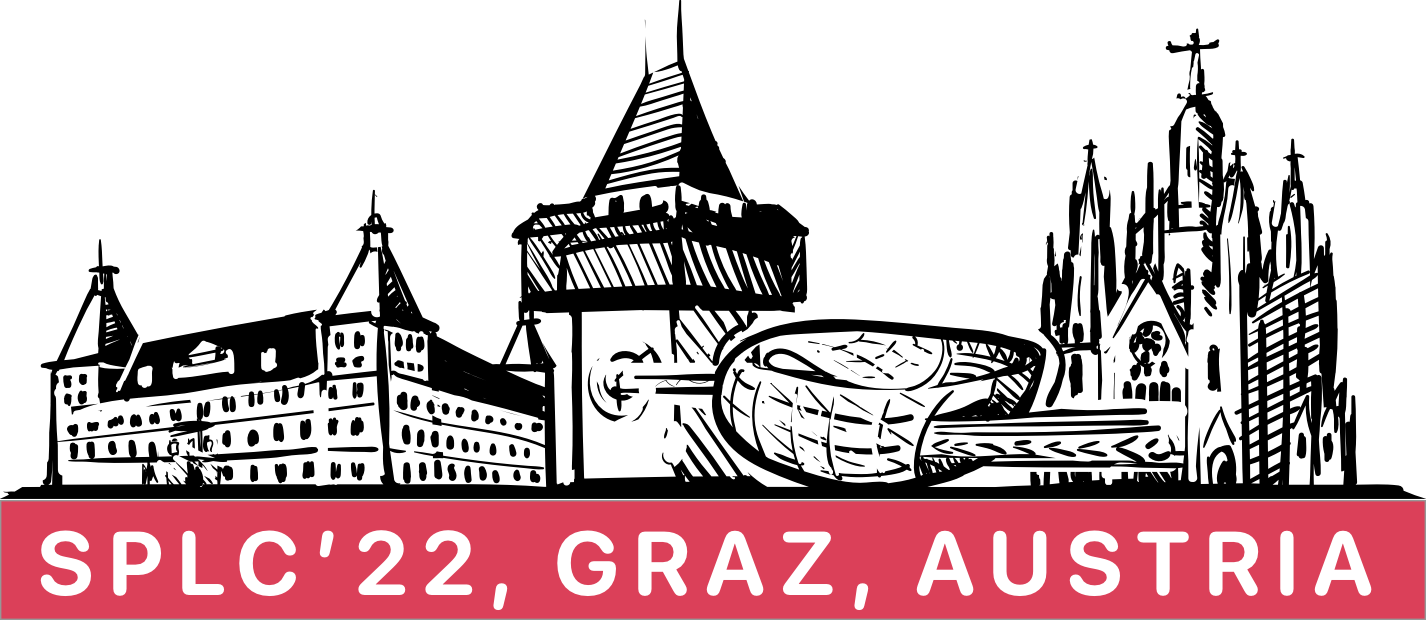We invite you to submit proposals for one-day or two-day workshops in any area related to the field of system and software product lines. In particular, workshops on challenging, emerging areas related to the conference topics are especially sought.
We particularly encourage proposals for highly interactive and collaborative workshops, rather than mini-conferences, e.g., apart from the traditional short and long papers, consider allowing position papers with only one page (not included in the proceedings) and focus on a lively discussion after the presentation, which can be conducted physically or virtually, to foster new ideas and gather feedback (rather than just defending the presented work). The expected dates of the workshops would be September 12th and 13th, 2022, before the main track of the conference.
The workshops will take place in physical and/or virtual form, depending on the situation with COVID-19. The workshop papers will be published by ACM as usual.
We do hope to be able to have a hybrid conference. However, in order to address personal or economic concerns, we can confirm that, in any scenario, SPLC 2022 will provide the opportunity to participate virtually and with a reduced registration pricing that factors out local costs (e.g. coffee breaks, lunches, and banquet). This applies also for workshops.
Important Dates (AoE Time)
Workshop proposal: February 14, 2022Notification: March 11, 2022Workshop papers submission: June 14, 2022Workshop papers notification: July 1, 2022Final version of papers + summary of the workshop: July 7, 2022- Workshops: September 12-13, 2022
SPLC workshop papers will be published in a volume of the SPLC conference proceedings published by ACM. Moreover, a one-page summary of each accepted workshop will be published in the proceedings as well.
Workshop proposals should be authored by at least two organizers, preferably from different institutions, and they should contain the following three sections and address each corresponding point:
1. Organizers
- Name: organizers’ full names
- Contact information: affiliations, job titles, postal addresses, e-mail addresses, URLs, and phone
- Brief biography: 100-200 words, focusing on the organizers’ expertise in the field and experience as workshop organizers
2. Workshop Content
- Title: workshop title and acronym
- Abstract: max 150 words describing the workshop (suitable for the conference’s website)
- Tentative Website URL
- Topics and motivation:
- What are the topics, themes, and areas of interest of the workshop?
- How is the workshop relevant to SPLC?
- How does the workshop connect SPLC to other research communities?
- Goals and expected results:
- Explicitly state the goals of the workshop and how you intend to reach them
- What are the expected results of the workshop?
- How will these results be disseminated?
- Format:
- What is the planned workshop format (paper presentations, working sessions, keynote talks, lightning talks, demonstrations, etc.)?
- With the aim of avoiding the workshop’s cancellation, in case of insufficient number of submissions, what is the “backup” plan?
- What will be done to stimulate collaborative interaction?
- If the workshop takes place in virtual form, what is the virtual plan? Please describe in a few sentences how to present research contributions and how to foster online discussion. You can use optionally the ACM guide as a source of inspiration: https://www.acm.org/virtual-conferences
- What are the planned pre- and post-workshop activities?
- Participants:
- What is the expected number of submissions and participants? Provide a plan for attracting sufficient submissions and promoting attendance
- If applicable, please provide information from previous or related workshops. Have there been previous workshops on the same or a closely related topic? When, where and with how many participants?
- Required equipment (if the conference remains physical): Overhead projector, PC projector, whiteboard, flip charts, microphone, etc.
- Program committee: list of tentative program committee members, names and affiliations.
3. Preliminary Call for Papers
This will necessarily repeat some of the information from the previous sections but should be targeted towards prospective participants. It should address the following items:
- Overview of the motivation, topics, and goals
- Workshop format
- Deadlines of the workshop (see dates in this call for proposals)
- Submission guidelines and review process
- References to previous workshops (websites)
Submission instructions
Please send your workshop proposals using EasyChair: https://easychair.org/conferences/?conf=splc2022
A workshop proposal must be at most 4 pages. Submissions must follow the ACM Master Article Template: https://www.acm.org/publications/proceedings-template
Relevant supporting material, such as proceedings from previous offerings of the proposed workshop or other workshops run by the proposal authors, should be included if available but are not required for submission.
Acceptance Criteria
Each workshop proposal will be evaluated according to the relevance of its topic, the expertise and experience of the workshop organizers, and the workshop’s potential for attracting participants and generating useful results. We underline the importance of active and creative workshops that foster a collaborative environment of interest to both practitioners and researchers, aiming, e.g., to evolve the field of software product lines and to identify elements of joint future work. To obtain a balanced and cohesive workshop program, the Organizing Committee will collaborate closely with workshop organizers and reserves the right to circulate proposals to other submitters in view of possible workshop mergers. The organizers of accepted workshops will be required to create and maintain a Website in a timely manner to serve as a workshop information center and to provide a repository for documenting pre- and post-workshop activities.
The SPLC proceedings will be published in the ACM Digital Library. SPLC is ranked as a top conference.At least one author of each accepted proposal must register and attend SPLC 2022 in order for the workshop to be accepted and the summary of the workshop published.
Chairs
Contact: splc22workshoptrack@easychair.org

